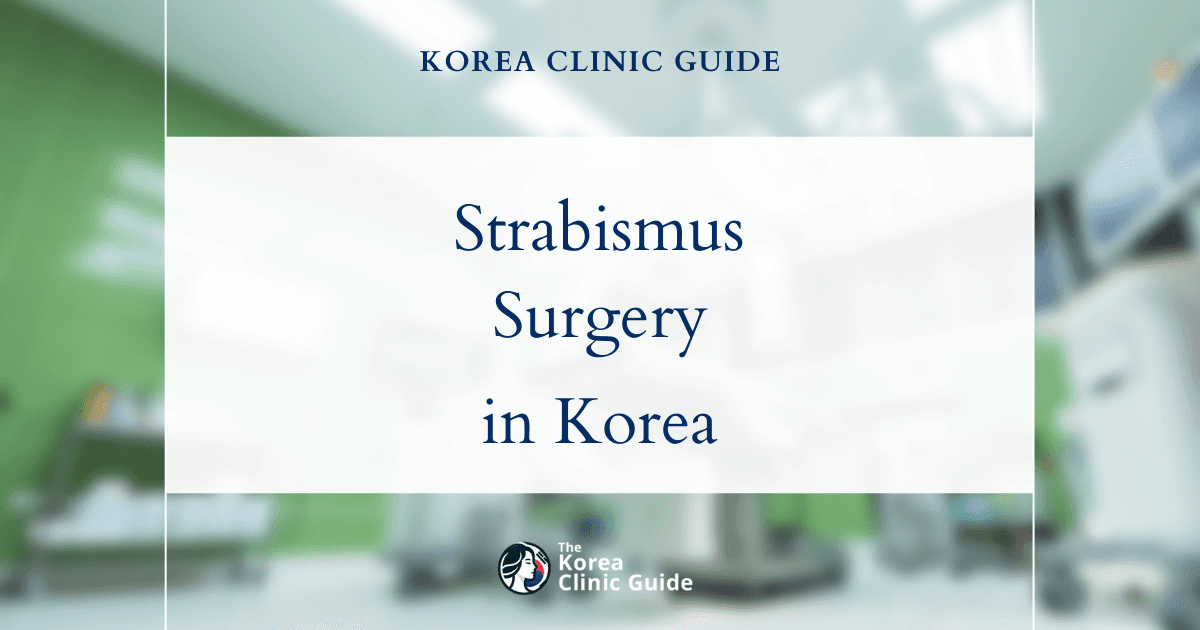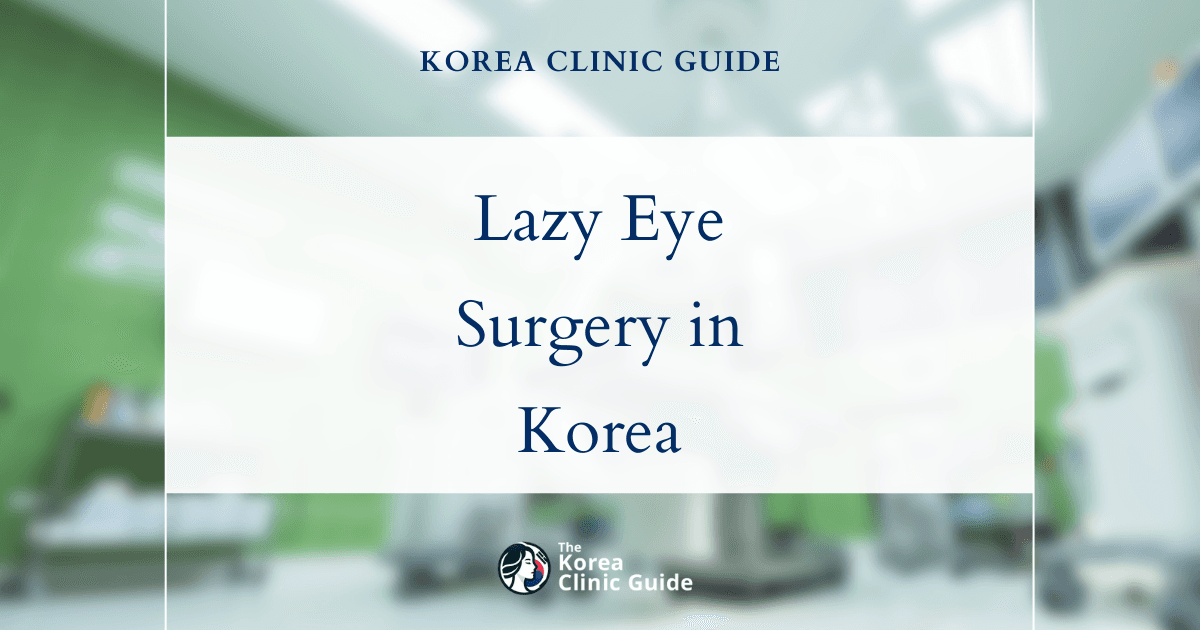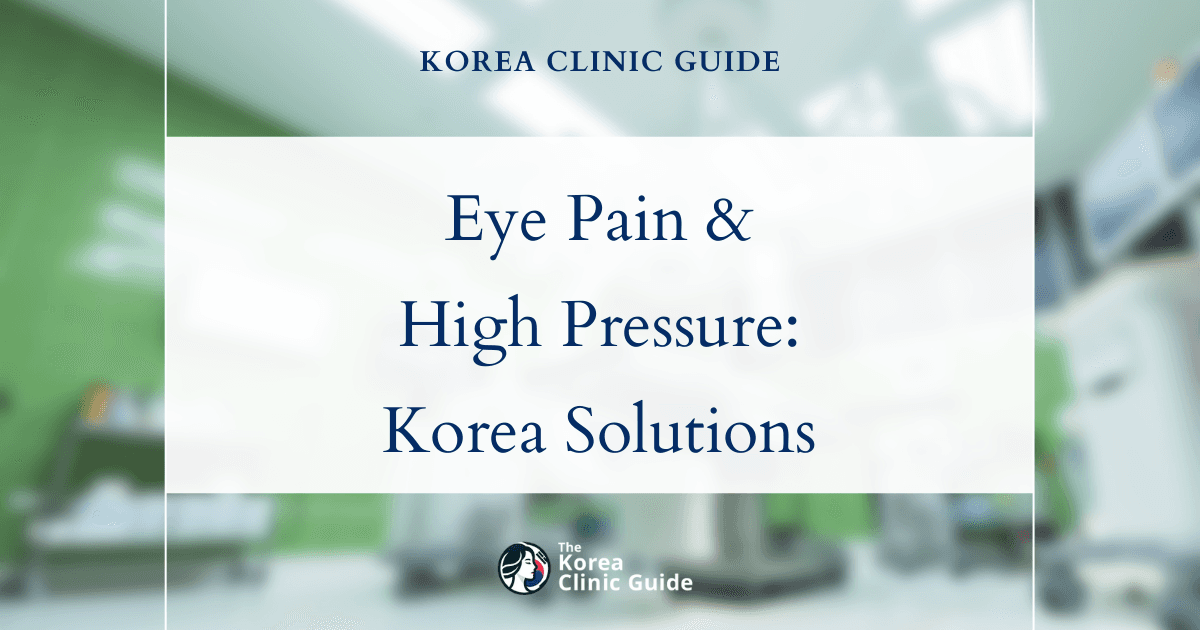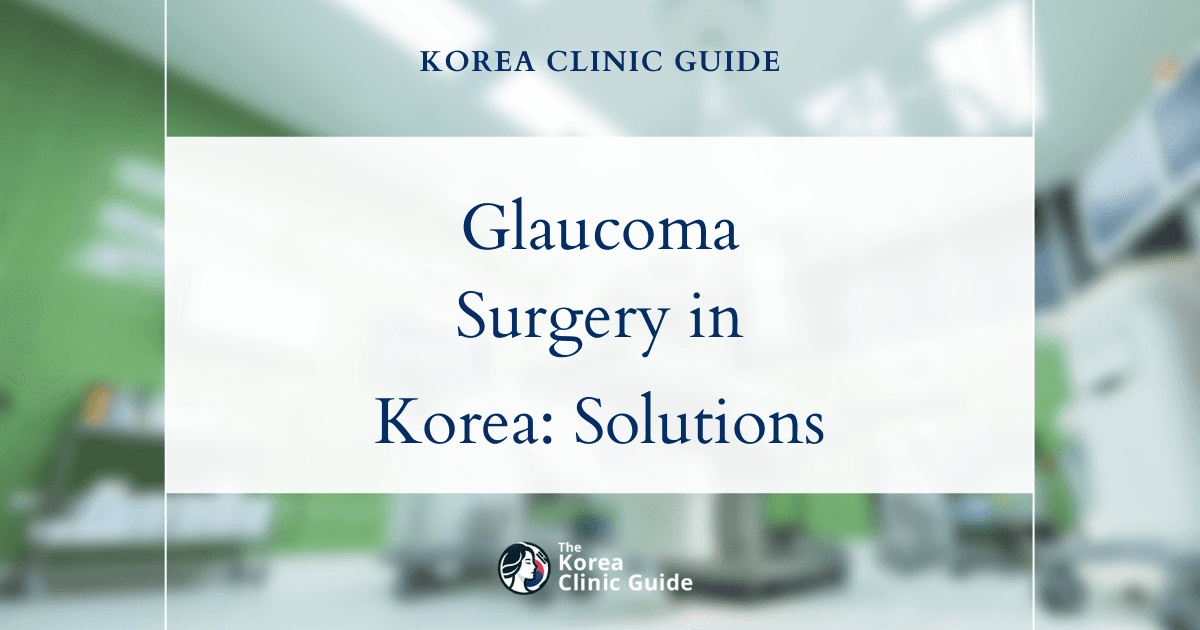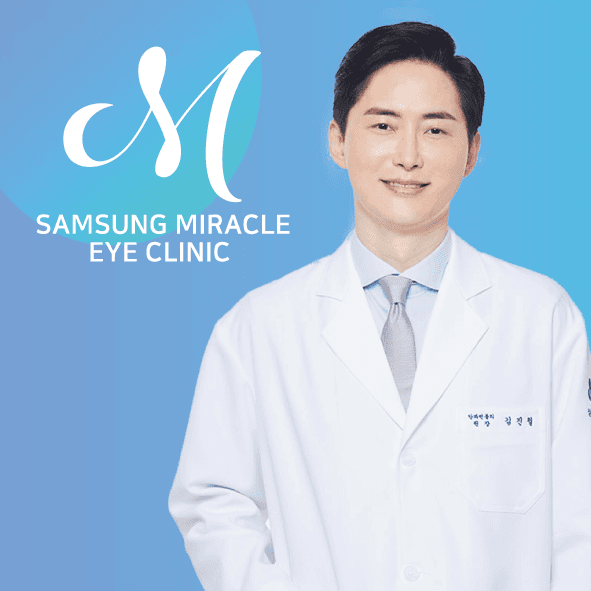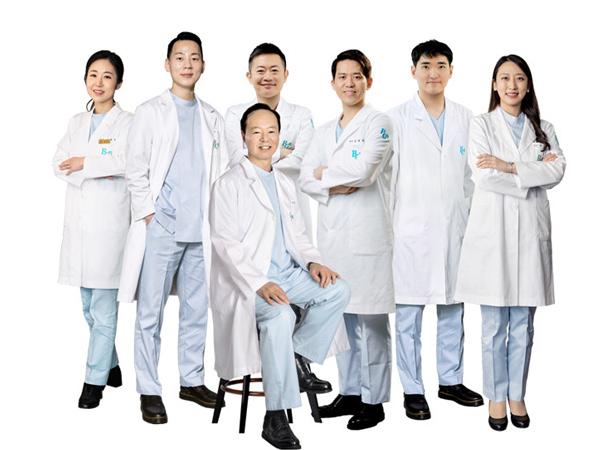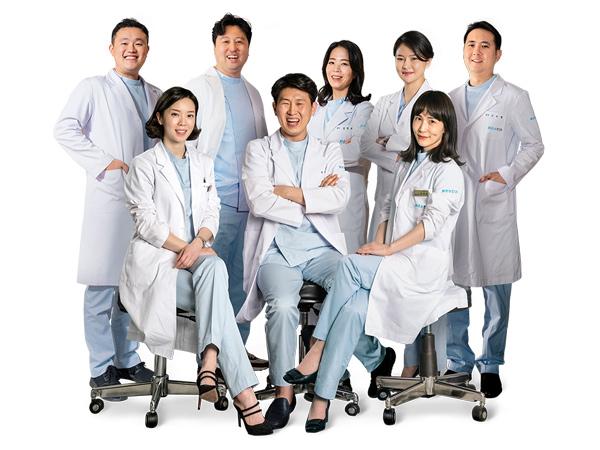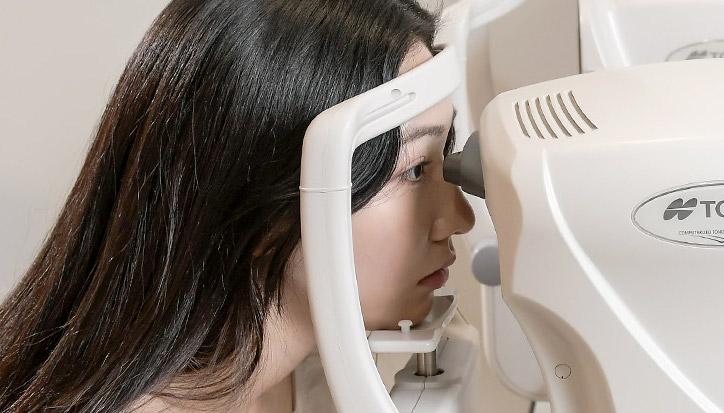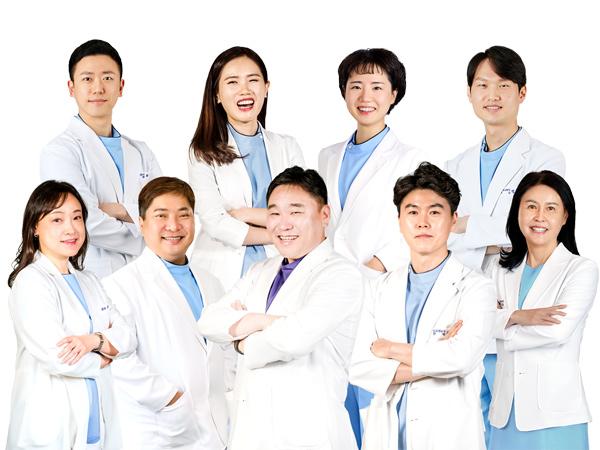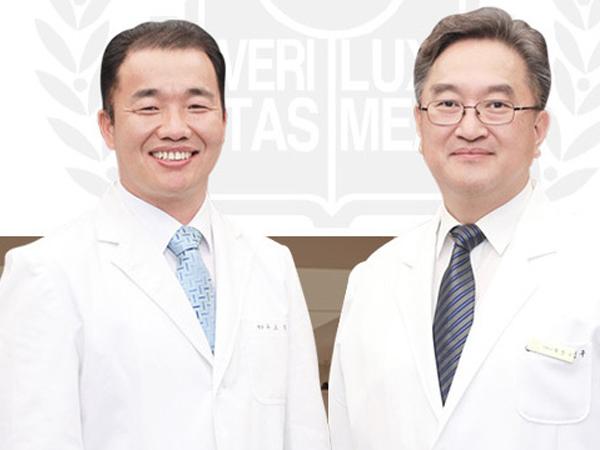Medical Tourism Blog
Vision Correction in Korea | Best Clinics, Costs, Procedure Types & More

Table of contents
- What Is Vision Correction?
- Who Can Benefit from Vision Correction?
- Types of Vision Correction Procedures
- Pros & Cons of Vision Correction
- Best Clinics in Korea for Vision Correction
- Vision Correction in Korea
- Alternatives to Vision Correction
- Conclusion
Considering treatment in Korea? Everything you need to know e.g. — how to avoid scams, visas, interpreters, recovery tips — in our Medical Tourism Master Guide. Plan with confidence in minutes, not weeks!
Are you tired of relying on glasses or contact lenses for clear vision? Discover why South Korea has become a global leader in advanced vision correction techniques, offering cutting-edge technology and world-class medical expertise. Whether you're considering LASIK, LASEK, or exploring non-surgical alternatives, this article provides essential insights into making an informed decision about your vision correction journey.
What Is Vision Correction?
Vision correction refers to a variety of medical procedures aimed at improving visual acuity, reducing or eliminating the need for corrective lenses such as eyeglasses or contact lenses. These procedures modify the eye's refractive properties to correct common vision issues like myopia (nearsightedness), hyperopia (farsightedness), astigmatism, and presbyopia (age-related loss of near vision). Vision correction can be achieved through surgical or non-surgical means, with the primary goal of enhancing the patient's quality of life by improving their vision.
Who Can Benefit from Vision Correction?
Myopia (Nearsightedness)
Individuals who have difficulty seeing distant objects clearly, but can see close objects well, suffer from myopia. Vision correction can help them to achieve clearer distance vision.
Hyperopia (Farsightedness)
People with hyperopia struggle with seeing close objects clearly while distant objects may be seen more easily. Vision correction procedures can help them see better at all distances.
Astigmatism
This condition causes blurry or distorted vision at any distance due to an irregularly shaped cornea. Vision correction can greatly improve visual clarity.
Presbyopia
Typically affecting people aged 40 and above, presbyopia hampers the eye's ability to focus on close objects. Specialized vision correction procedures can help restore near vision.
General Candidates
Good candidates for vision correction are usually over 18 years old, have healthy eyes, and have stable vision prescriptions for at least one year. Those with certain medical conditions or eye diseases may not be suitable candidates.
Types of Vision Correction Procedures
LASIK (Laser-Assisted In Situ Keratomileusis)
LASIK is one of the most popular laser eye surgeries, involving the creation of a thin flap in the cornea, reshaping the underlying corneal tissue, and then repositioning the flap. LASIK is known for its quick recovery time and high success rate.
PRK (Photorefractive Keratectomy)
PRK entails reshaping the cornea without creating a flap. Instead, the outer layer of the cornea is removed and the underlying tissue is reshaped. PRK is often recommended for individuals with thinner corneas.
LASEK (Laser Epithelial Keratomileusis)
A variation of PRK, LASEK involves lifting the corneal epithelium (outermost layer) before reshaping the cornea. It is suitable for patients with corneas that are too thin for LASIK.
SMILE (Small Incision Lenticule Extraction)
SMILE is a minimally invasive procedure that involves making a small incision in the cornea to remove a lenticule (small piece of tissue), thereby reshaping the cornea. This procedure is known for its precision and shorter recovery time.
RLE (Refractive Lens Exchange)
Also known as clear lens extraction, RLE involves replacing the eye's natural lens with an artificial intraocular lens (IOL). This procedure is similar to cataract surgery and is often used for presbyopia and severe hyperopia.
Phakic Intraocular Lenses (IOLs)
These lenses are implanted into the eye without removing the natural lens. Phakic IOLs are suitable for individuals with high prescriptions or those not eligible for laser procedures.
Pros & Cons of Vision Correction
Pros
- Improved Vision: Significant enhancement in vision quality and clarity is a primary benefit.
- Reduced Dependence on Glasses/Contacts: Many patients experience freedom from corrective lenses.
- Quick Recovery: Most modern procedures like LASIK offer rapid recovery times.
- High Success Rates: Advanced technology has increased the safety and effectiveness of vision correction surgeries.
Cons
- Potential Risks: As with any surgical procedure, there are risks such as infection, dry eyes, glare, and halos around lights.
- Not Always Perfect: Some patients may still require glasses for certain activities.
- Cost: Vision correction procedures can be expensive and are often not covered by insurance.
- Adjustment Period: Some individuals may need time to adapt to their new vision, especially after procedures like RLE and phakic IOLs.
- Irreversible: Most vision correction surgeries are permanent, which means that any issues arising post-surgery might be difficult to rectify.
Best Clinics in Korea for Vision Correction
Listed below are the best clinics in Korea for vision correction:
| Clinic Name | Key Features | Special Techniques |
|---|---|---|
| Samsung Miracle Eye Clinic Website | 1:1 personalized care; same doctor conducts your examination, surgery, and recovery for consistency, accountability, and tailored outcomes; all surgeons are ambidextrous, operating with equal precision in both eyes to support symmetry while minimizing contact with the nasal bridge for added safety and comfort; dedicated International Patient Team ensures the same level of quality, convenience, and support for patients from abroad; in-house diagnostic system and a patented Miracle Formula for precise lens power calculation; One-Day System enables same-day diagnosis and surgery without compromising accuracy; services span the full spectrum of eye care, including SMILE, LASIK, and LASEK; presbyopia and cataract solutions such as presbyopia cataract treatment and intraocular lens insertion; dry eye management, Dream Lens (orthokeratology), and re-calibration surgery to fine-tune previous procedures. | SMILE; LASIK; LASEK; presbyopia cataract treatment; intraocular lens insertion; Dream Lens (orthokeratology); re-calibration surgery |
| Bright Eye Clinic Website | Bright Eye Clinic in Gangnam combines world-class technology, comprehensive services, and seasoned expertise; offers full spectrum of refractive surgery, including SMILE Pro with the VisuMax 800—creating a precise lenticule in under 10 seconds—SMILE LASIK, LASIK, and LASEK for various corneal profiles; cataract program utilizes the Lumera 700 microscope for precise lens removal and IOL implantation, with a range of premium lens options tailored to each patient’s visual needs; detailed pre-surgery examinations and ongoing general eye health checkups for long-term care; backed by state-of-the-art equipment and experienced professionals, consistently providing high-quality care and successful outcomes in vision correction and cataract surgery. | SMILE Pro with VisuMax 800; SMILE LASIK; LASIK; LASEK; Cataract surgery with premium IOL options |
| BnVIIT Eye Clinic Website | Over 30 years of specialization with 550,000 successful surgeries; renowned for its cutting-edge AI Vision Correction Prediction System and comprehensive range of treatment options; delivers personalized, data-driven care across refractive surgery, implantable lenses, cataract surgery, and non-surgical vision correction; premier reputation in Gangnam, Korea, for advanced technology and comprehensive vision care. | SMILE; All-laser LASIK; All-laser LASEK (PRK); PIOL (Phakic Intraocular Lenses); Cataract surgery; Ortho-K (Dream Lens); Customizing options |
Samsung Miracle Eye Clinic
Samsung Miracle Eye Clinic, located at Gangnam Station, delivers 1:1 personalized care for vision correction. The same doctor conducts your examination, performs your surgery, and oversees your recovery for consistency, accountability, and tailored outcomes. All surgeons are ambidextrous, operating with equal precision in both eyes to support symmetry while minimizing contact with the nasal bridge for added safety and comfort. A dedicated International Patient Team ensures the same level of quality, convenience, and support for patients from abroad.
With a cutting-edge in-house diagnostic system and a patented Miracle Formula for precise lens power calculation, the clinic’s One-Day System enables same-day diagnosis and surgery without compromising accuracy. Services span the full spectrum of eye care, including SMILE, LASIK, and LASEK; presbyopia and cataract solutions such as presbyopia cataract treatment and intraocular lens insertion; as well as dry eye management, Dream Lens (orthokeratology), and re-calibration surgery to fine-tune previous procedures.
You can check out their website here: Samsung Miracle Eye Clinic Website
Bright Eye Clinic
Bright Eye Clinic in Gangnam stands out as the best choice for vision correction in Korea by combining world-class technology, comprehensive services, and seasoned expertise that attract patients from around the globe. The clinic offers the full spectrum of refractive surgery, from SMILE Pro with the VisuMax 800—creating a precise lenticule in under 10 seconds—to SMILE LASIK, LASIK, and LASEK for individuals with various corneal profiles, delivering minimally invasive treatments, comfort, and fast recovery. Its cataract program utilizes the Lumera 700 microscope for precise lens removal and IOL implantation, with a range of premium lens options tailored to each patient’s visual needs. Every journey begins with detailed pre-surgery examinations to ensure suitability and safety, complemented by ongoing general eye health checkups for long-term care. Backed by state-of-the-art equipment and experienced professionals, Bright Eye Clinic consistently provides high-quality care and successful outcomes in vision correction and cataract surgery.
Find more about this clinic here: Bright Eye Clinic Website
BnVIIT Eye Clinic
BnVIIT Eye Clinic, also known as B&VIIT Eye Center, is a premier ophthalmology clinic in Gangnam, Korea with over 30 years of experience and 550,000 successful eye surgeries. Renowned for its cutting-edge A.I. Vision Correction Prediction System and comprehensive range of treatment options, the clinic delivers personalized, data-driven care across refractive surgery, implantable lenses, cataract surgery, and non-surgical vision correction—making it a leading destination for safe, precise, and tailored outcomes.
-
30+ years of specialization with 550,000 successful surgeries, reflecting deep expertise and consistent results
-
A.I. Vision Correction Prediction System that supports personalized planning and procedure selection
-
Full spectrum of surgical and non-surgical options to match each patient’s eyes, needs, and lifestyle
-
Premier reputation in Gangnam, Korea, for advanced technology and comprehensive vision care
-
SMILE: A minimally invasive laser procedure that creates a small lens-shaped piece of corneal tissue (lenticule) removed through a tiny incision to correct vision
-
All-laser LASIK: Laser reshaping of the cornea to correct myopia, hyperopia, and astigmatism
-
All-laser LASEK (PRK): Surface laser reshaping after gently removing the thin outer corneal layer; well-suited for thinner corneas
-
PIOL (Phakic Intraocular Lenses): Implantable lenses placed in front of the natural lens, ideal for high refractive errors not suitable for laser procedures
-
Cataract surgery: Removal of the cloudy natural lens and replacement with an artificial intraocular lens to restore clear vision
-
Ortho-K (Dream Lens): Specially designed contact lenses worn overnight to temporarily reshape the cornea for clear daytime vision without glasses or contacts
-
Customizing options: Tailored treatment plans designed around each patient’s specific visual profile and lifestyle, aiming for optimal results and satisfaction
Find more about this clinic here: BnVIIT Eye Clinic Website
Vision Correction in Korea
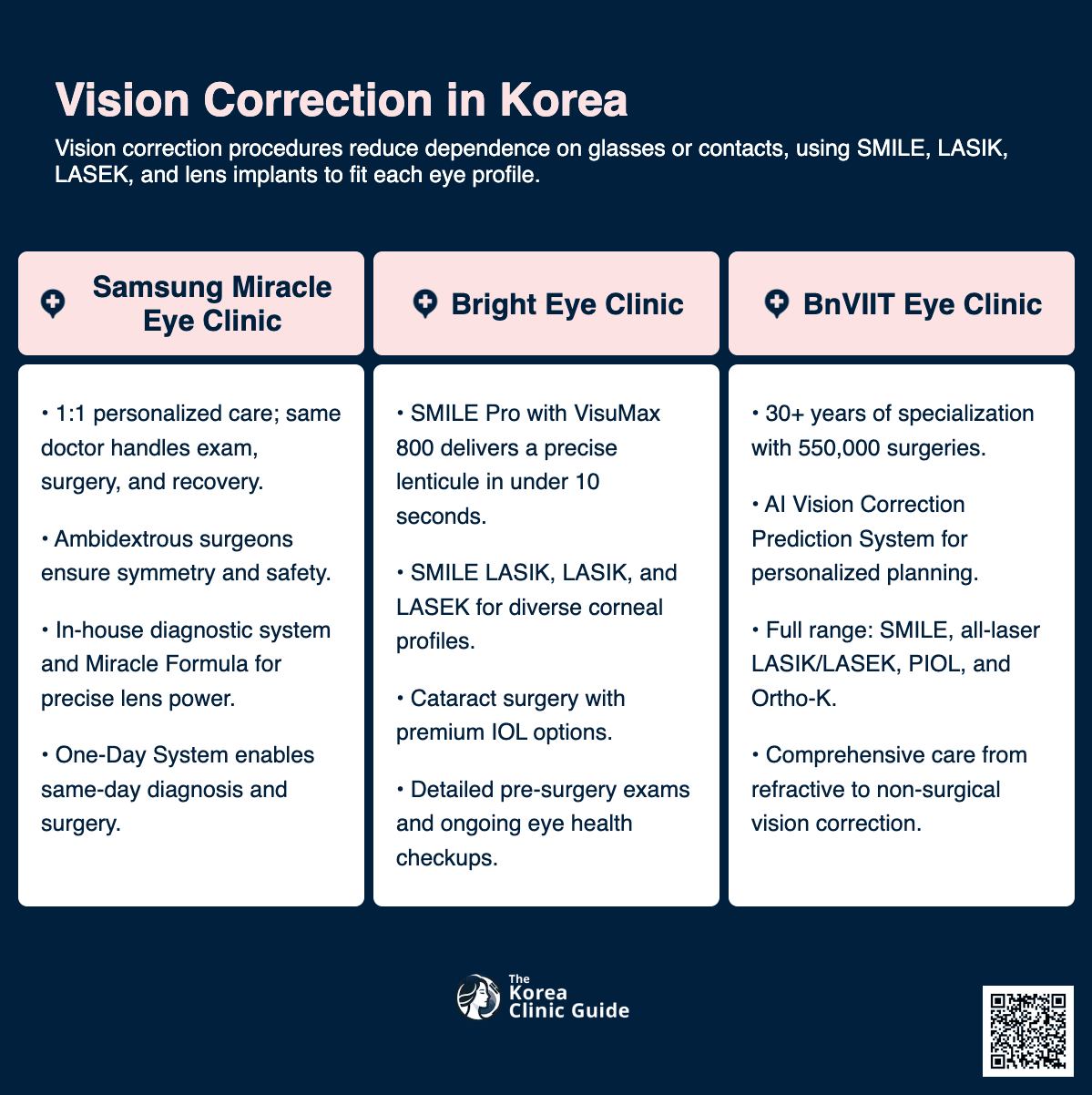
Opting for vision correction in Korea offers a unique blend of cutting-edge medical technology, experienced medical professionals, and rich cultural experiences. Here's a comprehensive look at what you can expect when you come to Korea for this specialized medical procedure.
World-Class Medical Facilities
Korea is renowned for its high-quality healthcare system and world-class medical facilities. When it comes to vision correction, options range from advanced LASIK and LASEK surgeries to the latest in SMILE (Small Incision Lenticule Extraction) procedures. These facilities are equipped with the latest medical technology, ensuring precise and effective treatments with minimal risk.
Experienced Medical Professionals
Korean ophthalmologists and surgeons are highly trained and often have years of experience in vision correction procedures. Many have received international training and are fluent in English, making it easier for international patients to communicate. Comprehensive pre-operative evaluations ensure that you receive a tailored treatment plan suited to your specific needs.
Affordable Treatment Options
Compared to Western countries, the cost of vision correction in Korea is relatively affordable, without compromising on quality. Numerous packages that include the surgery, pre- and post-operative care, and sometimes even accommodation, make it an attractive option for medical tourists.
Streamlined Medical Tourism Services
Korea excels in providing a seamless experience for medical tourists. From airport transfers to hospital appointments, many hospitals offer dedicated services to assist international patients. These services often include translators, coordinators, and even tours, ensuring that you have a smooth and worry-free experience.
Pre-Operative Consultations
Before undergoing any procedure, you will have an in-depth consultation where your medical history, vision condition, and treatment options will be discussed in detail. You may also undergo a series of diagnostic tests to determine the best course of action.
Post-Operative Care
Post-operative care in Korea is meticulous and thorough. Follow-up visits are crucial to ensure successful recovery and optimal results. Detailed instructions on medication, eye care, and activity restrictions will be provided to help you heal properly.
Cultural Experience
While in Korea, you can take the opportunity to explore its rich cultural heritage and modern attractions. From the bustling streets of Seoul to tranquil temples and scenic countryside, there’s plenty to see and do. Enjoy traditional Korean cuisine, shop in vibrant markets, and experience the unique blend of ancient and contemporary cultures.
Safety and Hygiene
Korean healthcare facilities adhere to strict safety and hygiene standards. You can expect a clean and organized environment with rigorous protocols in place to ensure patient safety, especially important in the context of surgical procedures.
Travel and Accommodation
Korea is well-connected with international flights arriving at Incheon and Gimpo airports. Accommodation options range from luxury hotels to budget-friendly guesthouses. Many medical facilities have partnerships with nearby hotels to provide convenient lodging for their patients.
Support Networks
Online forums and support groups for expats and medical tourists in Korea can provide invaluable advice and support throughout your journey. These communities can offer firsthand experiences and tips, ensuring you make the most informed decisions.
Choosing Korea for your vision correction procedure promises an experience that combines medical excellence with cultural enrichment. From the moment you arrive to your successful recovery, every aspect of your journey is carefully curated to meet the highest standards.
Alternatives to Vision Correction
Photorefractive Keratectomy (PRK)
Photorefractive Keratectomy (PRK) is a viable alternative to traditional LASIK surgery. Instead of creating a flap in the cornea, PRK involves removing the outer layer of the cornea called the epithelium. This allows the surgeon to reshape the underlying corneal tissue with a laser. The procedure results in a corneal abrasion that takes a few days to heal, often causing mild to moderate pain and temporary blurred vision. Visual recovery with PRK is generally slower than with LASIK, but it is considered safer for individuals who are more likely to experience trauma to the eye, such as those in contact sports or professions where eye injuries are common. PRK is also a preferable option for patients with thinner corneas.
Intraocular Lenses (IOLs)
Intraocular lenses (IOLs) are another alternative to LASIK, particularly suited for individuals with high degrees of nearsightedness that cannot be effectively treated with standard LASIK procedures. In this approach, corrective lenses are surgically inserted into the eye, typically placed in front of the natural lens. This technique is frequently employed in cataract surgery, where the cloudy natural lens is replaced with an artificial one. While IOLs are not a routine option for most individuals seeking vision correction, they are an effective solution for older adults who may need cataract surgery in the future, or for those whose refractive errors are beyond the correcting scope of LASIK.
Conductive Keratoplasty (CK)
Conductive Keratoplasty (CK) is a unique vision correction alternative that uses radiofrequency energy rather than a laser to reshape the cornea. This procedure is particularly beneficial for individuals above 40 years of age who have mild to moderate farsightedness. CK works by applying controlled heat to specific areas of the cornea, causing the tissue to shrink and thereby modifying the cornea's curvature to improve vision. As CK can offer immediate visual improvement with minimal discomfort, it is a suitable option for patients looking for non-laser-based treatments to correct farsightedness.
| Procedure Price | Korean Won (₩) | USD ($) |
|---|---|---|
| Low Price | ₩3,000,000 | $2200 |
| High Price | ₩5,000,000 | $3600 |
Exchange rate as of 2025-05-22: 1 KRW = 0.0007 USD
Please note that these prices are approximate guidelines and can vary significantly based on the clinic and your individual circumstances.
Conclusion
In conclusion, Korea has solidified its reputation as a global leader in vision correction, combining cutting-edge technology with highly skilled ophthalmologists to offer a wide range of advanced procedures. From LASIK and LASEK to innovative treatments like SMILE, patients are assured of receiving top-notch care in state-of-the-art facilities. The emphasis on patient safety, rigorous training, and post-operative support further enhances Korea's appeal as a premier destination for vision correction. As technology continues to advance, Korea is well-positioned to remain at the forefront of this field, offering hope and clarity to countless patients worldwide.

